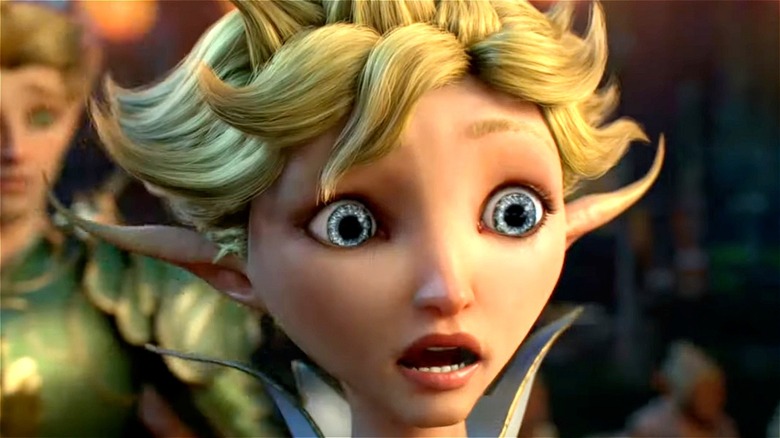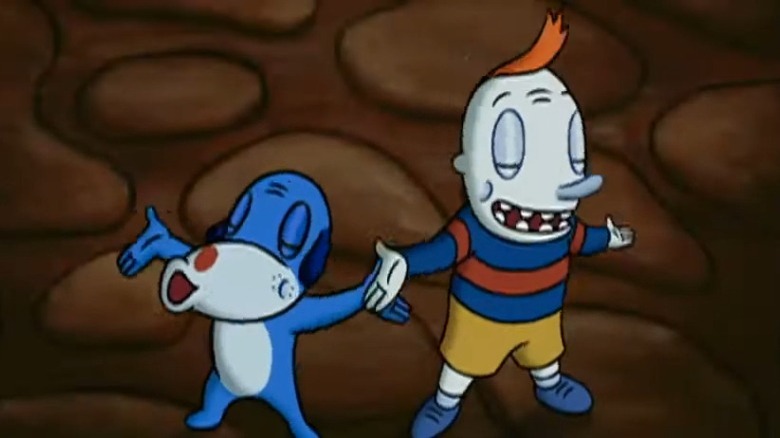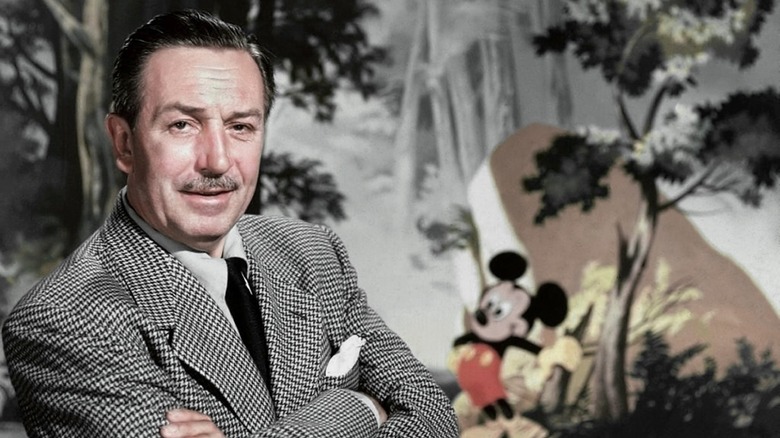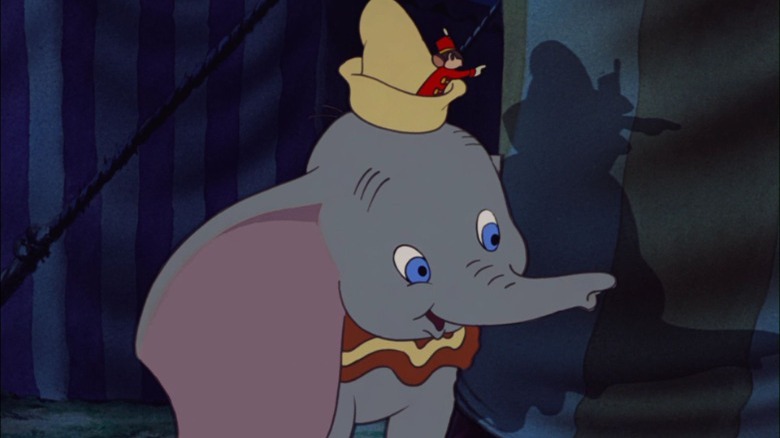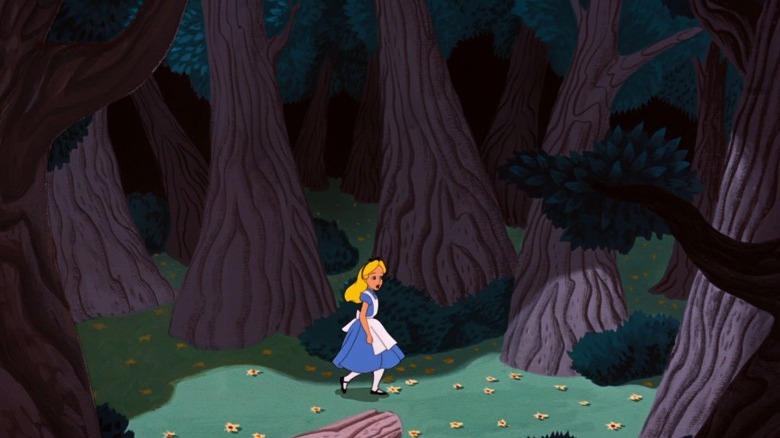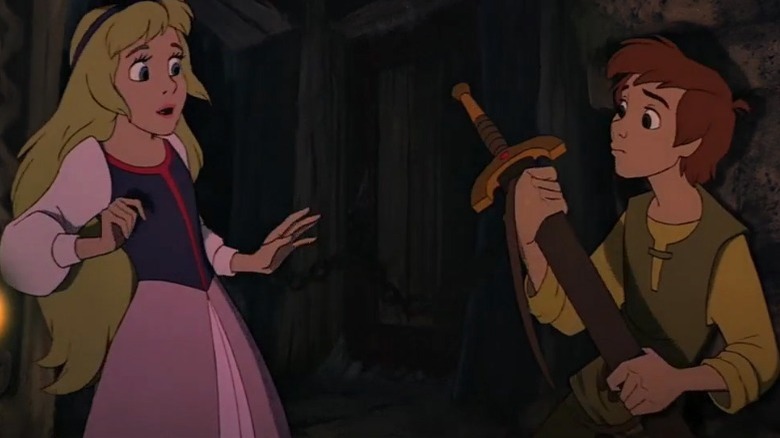The Disney Animated Movie That Made The Least Money In Theaters Will Surprise You
If there's a corporation that's synonymous with the magic of cinema for most people, it's Disney. To be sure, the American entertainment conglomerate has, in its decades of activity as a film studio and distributor, gifted audiences the world over with some of the most beloved family films of all time, animated or otherwise. But movie magic is not all Disney is synonymous with. There's nary a company in Hollywood that's more widely reputed for its ability to make money.
As a case in point, some of the biggest box office successes in animation history, including "Snow White and the Seven Dwarfs," "Frozen II," and both versions of "The Lion King," have come from Disney. And, if we extend consideration to Disney's distributing branch, the roster of successes becomes even greater, with the addition of Pixar smash hits like "Incredibles 2" and "Toy Story 4." But Disney has also been known to have a hand in its share of financial flops. And there's one particular flick that — rather unjustly — holds the title of lowest-grossing animated film ever released under the Disney banner.
Teacher's Pet grossed only $6 million in 2004
Disney has had a few infamous bombs throughout the years, and they were mostly huge investments that failed to pay off. This means that even notorious money-losers like "Treasure Planet" and "Mars Needs Moms" reached box office figures that, in isolation, might actually look pretty big — over $100 million (via Box Office Mojo), in the former's case, and just shy of $40 million (via Box Office Mojo), for the latter. To find the absolute lowest grosser in Disney's animation vault, you have to look at the small-budget, unassuming stuff that ended up falling short even of its own modest financial ambitions. You have to look at "Teacher's Pet."
A big screen adaptation of the eponymous cartoon series that ran from 2000 to 2002, "Teacher's Pet" was the rare Walt Disney Television Animation production to be entrusted with an actual theatrical release. But its box office results demonstrated why that happened so infrequently: Hampered by poor marketing and faced with wide-release audiences that weren't too familiar with the show, the film ultimately grossed only $6.5 million, marking it as a flop even against a small $10 million budget (via Forbes). It's a shame, too, because the film was actually quite beloved among the few who watched it. Critics loved its wit and offbeat energy, with Metacritic assigning it an impressive average rating of 74.
It's hard to measure classic Disney films' financial success
It's only inevitable that the absolute lowest grossing animated film distributed by Disney should be a little-known, small scale production hailing from its TV subdivision. However, if we look at the company's crown jewel, Walt Disney Animation Studios, which has developed and produced all of the "canon" Disney films, the conversation becomes a bit different.
It's hard to compare box office receipts for each of the 60 films in Walt Disney Animation's oeuvre for two reasons: The first is the change in ticket prices over its eight decades of feature filmmaking, and the second is the fact that many Disney films from the olden days got re-released many times throughout the years, thus allowing even original flops like "Alice in Wonderland" and "Sleeping Beauty" to eventually become majorly successful. That second reason is why "Teacher's Pet" places behind even mid-20th century Disney films that got released back when movie tickets cost a few cents, as those films were eventually vaulted into eight-digit absolute figures by later re-releases.
What this means is that the question "What in-house Disney Animation movie made the least money in theaters?" is actually rather tricky, and it depends heavily on your interpretation. And the "objectively" correct answer would, in fact, make very little sense in practical terms.
Dumbo grossed $1.3 million, but was highly successful for its time
If you want to know the Disney movie that had the lowest box office, in actual figures, not counting re-releases, "package" films, or the unusual roadshow model of "Fantasia," that would be "Dumbo." Per the book "Hollywood cartoons: American animation in its golden age" by Michael Barrier, the 1941 film grossed an estimated $1.3 million in North America. Given that European markets were curtailed at the time due to the emergence of World War II, its worldwide intake was probably not much higher than that. It was certainly not higher than those of its contemporaries, "Pinocchio," "Bambi," and history-making hit "Snow White and the Seven Dwarfs" (via Historical Journal of Film, Radio and Television), which all made around $3 million or more worldwide.
But of course, listing Dumbo — or any of the films from that period — among Disney's "lowest-grossing movies" would be absurd. Adjusted for 2021 ticket prices, even Dumbo's seemingly modest domestic box office prior to re-releases would be equivalent to over $47 million (via DaveManuel.com). In fact, the film was actually considered a major success for the time, as it was made with a much smaller budget than "Pinocchio" and "Fantasia," so as to turn a safe profit and recoup Disney's wartime box office losses.
The more interesting, and harder, question would be "What Disney Animation movie had the lowest gross for its time?" And, again, the answer depends on whether you're talking about the gross itself, or the losses incurred.
Alice in Wonderland is the lowest grosser classic when adjusted for inflation
Taking domestic box office figures as a reference point, since they're more readily available for older films than worldwide box office figures, the lowest-grossing in-house Disney Animation film adjusted for inflation would seem to be "Alice in Wonderland." The 1951 surrealist masterpiece failed to connect with audiences upon its original release, grossing only $2.4 million in domestic rentals (via Variety). That would be equivalent to about $41.5 million in contemporary figures.
Walt Disney himself was disappointed in the film, arguing audiences might have not taken to it because, in his view, it ultimately had no emotional appeal (via The New York Times). It was the rare Disney Animation film to never see a theatrical re-release during Disney's lifetime, instead being relegated to television (via The Walt Disney Family Museum).
It wasn't until the sixties' wave of psychedelia that the film found its audience. In 1971, the New York Times reported that the film had become extremely popular in college campuses across the United States, where packed screenings were regularly being programmed. This surge in popularity led to a 1974 re-release, which in turn led to other re-releases (via Moviefone) — and, from then on, the movie managed to cement its status as a classic.
The Black Cauldron is still Disney Animation's biggest in-house flop
Whereas "Alice in Wonderland" eventually found its moment in the sun, 1985's "The Black Cauldron" has never quite managed to outgrow its reputation as Disney Animation's biggest, most traumatic, most catastrophic flop, if net losses are taken into consideration.
Although its $21.3 million domestic gross (via Box Office Mojo) would translate to an adjusted figure of $54.9 million in contemporary values, which is more than "Alice in Wonderland," the net loss of "Black Cauldron" was much more significant, as its budget of over $40 million became the biggest ever for an animated film at the time (via Slate). Where "Alice in Wonderland," per Michael Barrier's book "The Animated Man: A Life of Walt Disney," lost the studio one million dollars, "Cauldron" resulted in a loss so massive it nearly caused Disney Animation to be shut down entirely.
That's certainly a lot more trouble than poor "Teacher's Pet" could hope to stir — but at a company where no loss goes unpunished, even that movie's small-scale failure had consequences. After "Teacher's Pet," Disney never released another film from its TV animation division in theaters again.
